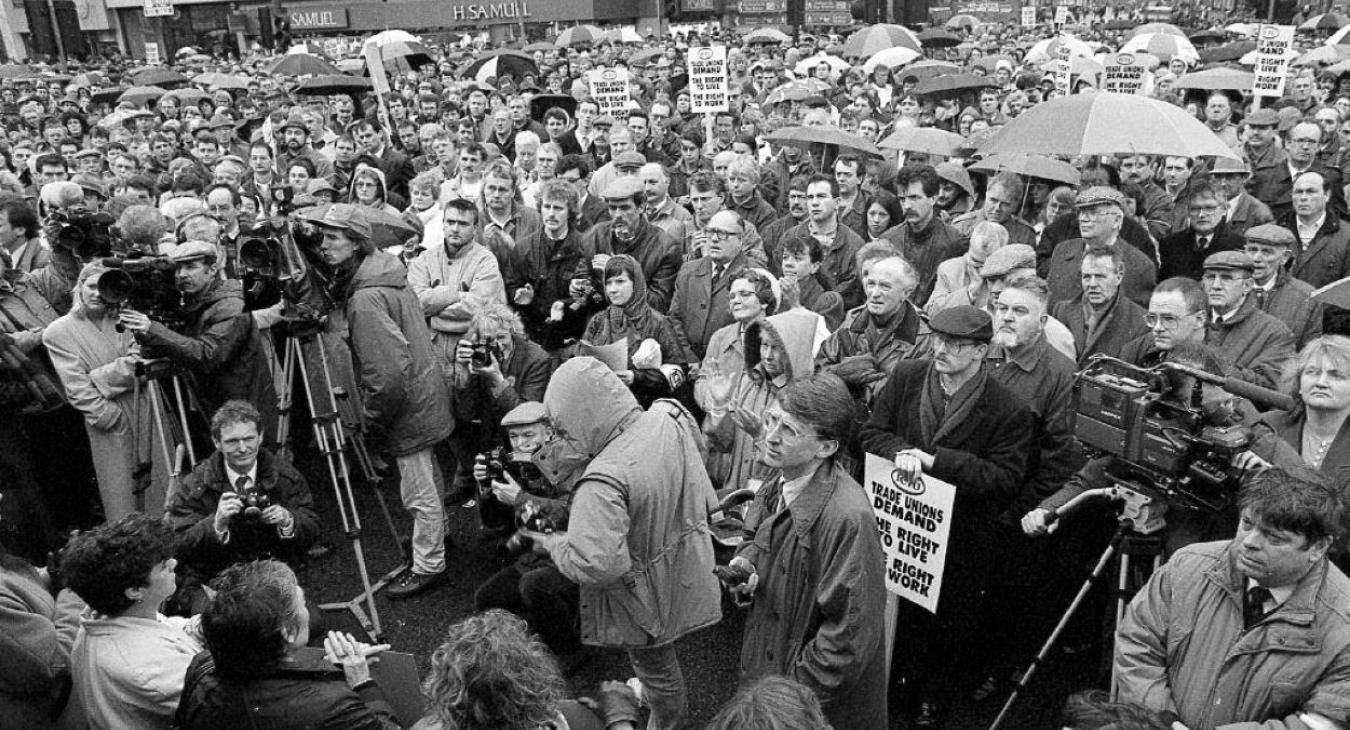On this Good Friday, 2023, ICTU’s leadership reflects upon the 25th anniversary of the Belfast Good Friday Agreement.
Speaking on behalf of the Irish Congress of Trade Unions, which represents over 800,000 people in 40 unions on the island of Ireland, Assistant General Secretary Gerry Murphy observed that:
“1998 began with a wave of sectarian murders and peace talks in Stormont which seemed to be floundering after months of discussions with seemingly little progress. One undermined the other, and in the face of hopelessness, some people took real risks for peace.
ICTU and local trades councils organized large rallies in seven towns and cities under the banner of ‘Stop All the Killings’ with activists ensuring that each rally was reflective of the entire trade union movement. The comments made from all seven platforms reflected the long-held policy of NIC-ICTU:
The right to live free from violence, intimidation, sectarianism, and discrimination:
The right to well-paid employment;
The right to adequate housing, health, and education services;
The right to advocate political change through peaceful means.
“There can be no successful peace process through the exclusion of others. No one can be forced to participate, but no one can be left behind if they are willing to take part and be part of changing society for the better.“Trade unionists understood this then, as they do now, coming from working-class areas beside many of the people who had committed or defended terrible acts. These same communities also contained most of the victims of the violence since 1969.
“When Congress reacted to the Agreement signed on 10 April 1998, it stated that: ‘Congress believes that overall it represents an important step towards Peace and Reconciliation. In the unprecedented circumstances now prevailing, Congress is therefore uniquely recommending that trade union members vote YES in the Referenda on 22 May.’
The support we pledged then is still in place. The Agreement remains the roadmap to a decent future for all.”
ICTU President Kevin Callinan commented upon the geographical scope and ambition of the Agreement, Strands 2 & 3:
“The roles of trade unions in the Agreement was acknowledged by Mo Mowlam at the 1998 TUC conference where she praised ‘the unions for playing a key role in bringing about change in Northern Ireland,’ and that ICTU had ‘made an invaluable contribution to the achievement of an outstanding Yes vote in the May referendum.’
“In turn, we acknowledge the friendship and support we have received from trade unionists in England, Scotland, and Wales, as well as the wider EU. This was particularly important in highlighting the threat Brexit posed to the Agreement during the 2016 referendum campaign. ICTU has continued our close collaboration with our GB colleagues in campaigning for better workers’ rights and public services: And also against austerity and a chaotic Brexit.
“Likewise, the creation of North-South bodies fostered a deeper civic and social engagement across the border which deepened the cooperation and mutual understanding among trade unionists across this island. Real progress has been made, and we are determined to see it continue.”
In conclusion, ICTU General Secretary Owen Reidy summarized by reiterating:
“Congress still believes that the values and principles of the Agreement are precious and that the best tribute to those words and the people who crafted them is to fulfill the Agreement in its entirety. “There has been too much rollback of many of the unique progressive innovations in the Agreement:
The Civic Forum was underfunded, then marginalized, now forgotten;
The Single Equality Act has been mothballed;
The Bill of Rights was obstructed, misrepresented, and finally blocked.
“Other progressive possibilities were undone by neoliberal ‘reforms’ which cost much, achieved little, and were themselves mothballed, such as privatizing NI Water and cutting Corporation Tax.
“Meaningful reforms to public services could have been achieved in the spirit of partnership which embodied the Agreement, but each step forward was knocked back by budget squeezes, political crises, and the regular suspensions of the B/GFA institutions, not to mention extraneous shocks from the 2008 financial crisis, to the war in Ukraine, and most challenging of all, Brexit.
“This challenge will have to be overcome, and we hope sense will prevail and the same willingness to take political risk will echo from 1998 until 2023 and beyond.”

